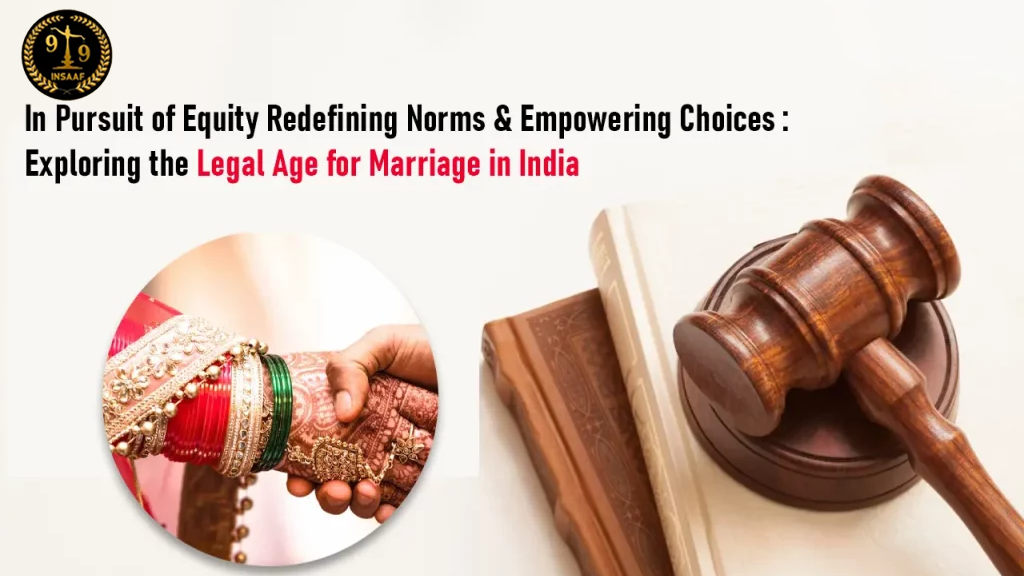

Online Legal Advice from Insaaf99® Online Lawyer Consultation in India


Online Legal Advice from Insaaf99® Online Lawyer Consultation in India

In the rich diversity of Indian culture, marriage occupies a significant position. It is essential to comprehend the legal age for marriage in India to safeguard the well-being of individuals and foster a society that prioritizes informed choices. This in-depth examination explores the legal aspects, societal consequences, and recent updates concerning the legal age for marriage in India. Let us delve into the legal age for marriage in India, exploring the historical context, current regulations, and ongoing debates surrounding this crucial aspect of personal life.
The issue of child marriage has deep historical roots in India, influenced by entrenched social practices and patriarchal norms. In the past, there was a lack of clear definition regarding the legal age for marriage, resulting in the widespread occurrence of underage marriages, especially among girls. This pervasive practice had extensive and harmful consequences, affecting the health, education, and overall development of young individuals.
To address the widespread issue of child marriage and safeguard the rights of minors, the Indian government introduced the Prohibition of Child Marriage Act in 2006. This groundbreaking legislation set the legal age for marriage at 18 years for women and 21 years for men. This legislative initiative marked a crucial advancement in protecting the well-being of young individuals and fostering gender equality within the institution of marriage.
Navigating the landscape of marriage age in India involves confronting the complex interplay between legal mandates and deeply ingrained societal norms. Despite the establishment of a legal age for marriage, diverse regional practices often diverge from these stipulations, presenting a challenge in ensuring consistent enforcement.
Regional Disparities: Societal practices related to marriage age vary widely across different regions of India, creating a nuanced scenario that requires localized understanding and targeted interventions.
Clash of Norms: The clash between age-old social norms and contemporary legal provisions introduces complexities, making it imperative to bridge the gap through strategic measures.
Enforcement Challenges: Effective implementation of the legal age for marriage faces hurdles, demanding a concerted effort from legal bodies, non-governmental organizations (NGOs), and influential community figures.
Collaborative Solutions: Addressing these challenges necessitates collaboration between legal institutions, NGOs, and community leaders. The goal is to foster awareness and instigate a cultural transformation towards more responsible and legally compliant marital practices.
Multifaceted Approach: Achieving alignment between societal practices and legal standards requires a multifaceted approach. This involves legal advocacy, community engagement, and a collective commitment to upholding the rights and well-being of young individuals
The societal impact of defining the legal age for marriage in India extends beyond legal boundaries, demanding a comprehensive and collaborative strategy to harmonize practices and protect the rights of individuals across the nation.
Also Read: - Section 13 of Hindu Marriage Act: Punishment for Unlawful Activities
Embarking on marriage at a young age extends far-reaching consequences to an individual's health and educational trajectory. Early marriages often act as barriers to educational pursuits, curbing the potential for holistic personal and professional development. This intersection between marital decisions and educational pathways underscores the significance of adhering to the legally defined age for marriage.
Educational Limitations: Early marriages impose constraints on educational aspirations, hindering the pursuit of knowledge and skills crucial for personal and professional advancement.
Stifled Growth: The intersection of marital responsibilities with educational endeavors can stifle personal growth, limiting opportunities for a well-rounded development.
Health Risks: Particularly for young brides, early pregnancies associated with early marriages pose inherent health risks. Adhering to the legal age for marriage becomes pivotal in mitigating these health concerns.
Holistic Well-being: Recognizing the interconnectedness of health and education, upholding the legal age for marriage becomes imperative for fostering the overall well-being of individuals.
The health and educational implications of marrying at a young age underscore the intricate balance needed to ensure individuals can pursue their educational aspirations and safeguard their physical well-being. Upholding the legal age for marriage becomes a critical component in facilitating a pathway to comprehensive personal development.

The legal age for marriage in India has evolved through amendments, notably in 1978, equalizing the age for girls and boys. The 2006 Prohibition of Child Marriage Act strengthened penalties and introduced support for child brides. In 2021, the proposed amendment aims to raise the legal age for women to 21, sparking debates on gender equality and societal impact. This dynamic landscape reflects the intricate interplay of tradition, individual rights, and progress. Addressing child marriage requires a comprehensive approach, encompassing legal measures, education, economic empowerment, and cultural shifts. The journey towards eradicating this practice underscores India's commitment to progress and equality.
In conclusion, the legal age for marriage in India is a crucial safeguard for the rights and well-being of young individuals. While progress has been made in addressing child marriage, ongoing challenges persist. Balancing gender equality with cultural sensitivities requires a multifaceted approach involving education, empowerment, and societal transformation. As India navigates the evolving landscape of marriage, ensuring the protection and development of its youth remains paramount.
Insaaf99, an online legal consultation platform, plays a pivotal role in addressing legal issues related to the evolving landscape of the legal age for marriage in India. This platform bridges the gap between citizens and legal experts, fostering awareness and understanding of the legal intricacies surrounding marriage. In doing so, Insaaf99 contributes to the broader societal goal of promoting legal literacy and facilitating informed decision-making in matters critical to individual well-being, such as marriage.